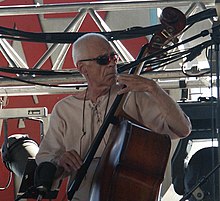Tales of Another
| Tales of Another | ||||
|---|---|---|---|---|
| Studio album by Gary Peacock | ||||
|
Publication |
||||
| Label (s) | ECM | |||
|
Format (s) |
LP, CD, |
|||
|
Title (number) |
6th |
|||
|
running time |
48:30 |
|||
| occupation |
|
|||
|
Studio (s) |
Generation Sound Studios, New York City |
|||
|
||||
Tales of Another is a jazz album by Gary Peacock . The recordings were made in February 1977 at Generation Sound Studios, New York City and were released by ECM that same year . The album, recorded with pianist Keith Jarrett and drummer Jack DeJohnette , can be seen as the beginning of the piano trio that became known as Keith Jarrett's "Standards Trio" from the mid-1980s.
The album
In February 1977 Gary Peacock, Keith Jarrett and Jack DeJohnette first got together to record the Peacock album Tales of Another , Peacock's third album under his own name (after Eastward (1970) and Voices (1971) with pianist Masabumi Kikuchi ) and its first production for the Munich-based ECM label. Peacock later commented on the line-up: “I only knew beforehand that I wanted Jack [DeJohnette], but I wasn't sure about the pianist. At the time I wasn't privy to or knew Keith. So I asked Manfred [Eicher] if he could send me some of his music. "
According to Uwe Andresen, Vignette , the album's first title, has “an almost dark, melancholy mood”, while Tone Field , “a game with tonal mixes” is strongly oriented towards free jazz . In Major Major, on the other hand, an “almost classical piano trio” can be heard. The three-part trilogy develops in an "extremely calm atmosphere" after harmless, almost traditional parts into a "collective high-altitude flight."
After the recordings, Peacock approached the pianist about a joint tour, which he refused and preferred to concentrate on his solo concerts. Jarrett continued to work with this trio in January 1983 in the two-day Standards session, during which the three ECM albums Standards, Vol. 1, Standards, Vol. 2 and Changes were created.
Title of the album
- Gary Peacock - Tales Of Another (ECM Records - ECM 1101)
- Vignette - 7:06
- Tone Field - 7:58
- Major Major - 9:05
- Trilogy, No. 1 - 8:34
- Trilogy, No. 2 - 9:46
- Trilogy, No. 3 - 6:20
- All compositions are by Gary Peacock.
reception
Shortly after its release, the album received positive reviews; the Jazz Forum wrote in 1984, records such as Belonging with Jan Garbarek (1974) or Tales of Another document the "progressive evolution of the pianist" Jarrett. The album received the Jazz Disc Grand Prix Silver Award from the Japanese Swing Journal .
Uwe Andresen said: “The musical understanding that the musicians have for each other in this first joint production is amazing.” Ian Carr described Tales of Another as “one of the greatest records of the decade, and a blueprint for the Keith Jarrett trio began six years later. “The six Peacock compositions span formal harmonic structures, modal music and rather free improvised areas. "The game of all three is incredible." The critic of the Peterborough Standard in England wrote: "There are some dark moments, perfectly executed and emotionally carried, but the prevailing mood is that of controlled exuberance."
The critics Richard Cook and Brian Morton , who rated the album with the second highest rating of 3½ stars in their Penguin Guide to Jazz , particularly emphasized Peacock's bass playing in Vignette and in Trilogy I-III , which silences any claim that this was merely another Keith Jarrett album, only generously renamed. In fact, it's Keith Jarrett's last appearance as a sideman. Of course the pianist is familiar with Peacock's music; At the same time, there is a degree of intuition among the musicians in this work, which is the basis for their later standard appearances, but it is unmistakably Peacock's record.
Scott Yanow awarded the album four (out of five) stars in Allmusic and emphasized that their support for each other in playing together and the dense communication with each other in these highly developed improvisations was almost impressive and a good example of Peacock's music. For JazzTimes (1995), Gary Peacock's album was one of Jarrett's excellent accompaniment sessions, despite his singing while playing.
Rez Abbasi wrote about Major Major in JazzTimes (2012) that Peacock, as the composer, developed a " twelve-tone sensitivity for major triads, played over an organ point ". The resulting piece is amazing, and this session marked a new direction in Peacock's development, fueled by its connection with ECM.
Individual evidence
- ↑ a b Album portrait at ECM
- ↑ Uwe Andresen: Keith Jarrett - His life, his music, his records . Oreos, Gauting 1985, ISBN 3-923657-09-9 , p. 72.
- ↑ a b David R. Adler: Keith Jarrett, Jack DeJohnette & Gary Peacock: Standard Bearers. In: JazzTimes. 2008.
- ↑ a b c Uwe Andresen: Keith Jarrett - His life, his music, his records . Oreos, Gauting 1985, ISBN 3-923657-09-9 , p. 157 f.
- ↑ Jazz Forum. 1984, issues 86-91, p. 52.
- ↑ ECM catalog 1982.
- ↑ Ian Carr , Brian Priestley , Digby Fairweather (Eds.): Rough Guide Jazz. ISBN 1-85828-137-7 , p. 500.
- ↑ In the original: There are some sombre moments, perfectly paced and emotionalley sustained, but the main feeling is one of controlled exuberance . Quoted from the ECM catalog 1982.
- ^ Richard Cook , Brian Morton : The Penguin Guide to Jazz on CD . 6th edition. Penguin, London 2002, ISBN 0-14-051521-6 .
- ↑ Gary Peacock: Tales of Another on Allmusic (English)
- ↑ Jazz Times. 1994, volume 24.
- ↑ Rez Abbasi: Artist's Choice: Gary Peacock (2012) in JazzTimes
